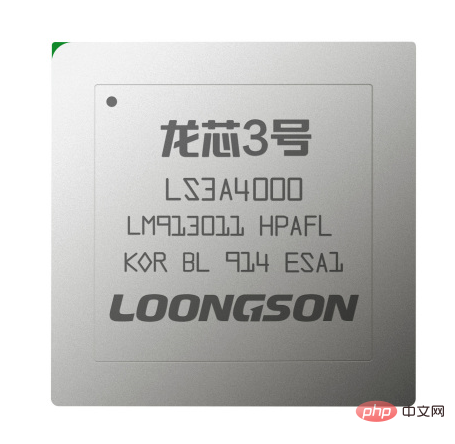What is the architecture of Loongson?
Loongson adopts a completely independent instruction set architecture "Loongson Architecture". From the top-level planning of the entire architecture, to the functional definition of each part, to the coding, name, and meaning of each instruction in detail, the Loongson architecture is independently redesigned with full autonomy. The Loongson architecture abandons some of the outdated content in the traditional instruction system that is not suitable for the current development trend of software and hardware design technology, and absorbs many advanced technological development achievements in the field of instruction system design in recent years.

The operating environment of this tutorial: Windows 7 system, Dell G3 computer.
Loongson adopts a completely independent instruction set architecture "Loongson Architecture".
Loongson is a general-purpose high-performance microprocessor chip independently developed by the Institute of Computing Technology, Chinese Academy of Sciences.
Loongson is a general-purpose CPU independently developed by the Institute of Computing Technology, Chinese Academy of Sciences. It adopts the independent LoongISA instruction system and is compatible with MIPS instructions. "Loongson-1", born on August 10, 2002, is my country's first general-purpose high-performance microprocessor chip with independent intellectual property rights. Loongson has developed three series of processors, No. 1, No. 2, and No. 3, and the Loongson bridge chip series since 2001, which have been widely used in government and enterprise, security, finance, energy and other application scenarios. The Loongson 1 series is a 32-bit low-power, low-cost processor, mainly for low-end embedded and specialized applications; the Loongson 2 series is a 64-bit low-power single-core or dual-core[5] series processor, mainly for low-end embedded and specialized applications. Industrial control and terminal fields; Loongson 3 series is a 64-bit multi-core series of processors, mainly for desktop and server fields.

Loongson Architecture:
In 2020, Loongson Zhongke launched Loongson based on twenty years of CPU development and ecological construction accumulation. Architecture (LoongArch), including the basic architecture part and extension parts such as vector instructions, virtualization, binary translation, etc., with nearly 2,000 instructions.
On April 15, 2021, the infrastructure of Loongson Autonomous Command System Architecture (Loongson Architecture, hereinafter referred to as Loongson Architecture or LoongArch) passed the evaluation of a well-known domestic third-party intellectual property evaluation agency, and was listed in the 2021 Information Technology It was officially released on the main forum of the Application Innovation Forum.
The Loongson architecture has three characteristics: complete independence, advanced technology, and ecological compatibility.
The Loongson architecture is independently redesigned from the top-level planning of the entire architecture, to the functional definition of each part, to the coding, name, and meaning of each instruction in detail, and has full autonomy.
The Loongson architecture abandons some of the outdated content in the traditional instruction system that is not suitable for the current development trend of software and hardware design technology, and absorbs many advanced technological development achievements in the field of instruction system design in recent years. Compared with the original compatible instruction system, not only is it easier to design high-performance and low-power consumption in terms of hardware, but it is also easier to compile and optimize and develop operating systems and virtual machines in terms of software.
The Loongson architecture fully considers the ecological requirements for compatibility when designing, and integrates the main functional features of various international mainstream command systems. At the same time, relying on the Loongson team's more than ten years of technological accumulation and innovation in binary translation, it can not only ensure that existing Loongson computers apply lossless binary migration and can achieve efficient binary translation of a variety of international mainstream instruction systems.
In December 2022, the domestic LoongArch architecture is in full swing and has received support from multiple industry mainstream specifications and applications.
If you want to read more related articles, please visit PHP Chinese website! !
The above is the detailed content of What is the architecture of Loongson?. For more information, please follow other related articles on the PHP Chinese website!

Hot AI Tools

Undresser.AI Undress
AI-powered app for creating realistic nude photos

AI Clothes Remover
Online AI tool for removing clothes from photos.

Undress AI Tool
Undress images for free

Clothoff.io
AI clothes remover

AI Hentai Generator
Generate AI Hentai for free.

Hot Article

Hot Tools

Notepad++7.3.1
Easy-to-use and free code editor

SublimeText3 Chinese version
Chinese version, very easy to use

Zend Studio 13.0.1
Powerful PHP integrated development environment

Dreamweaver CS6
Visual web development tools

SublimeText3 Mac version
God-level code editing software (SublimeText3)

Hot Topics
 1378
1378
 52
52
 Comparative analysis of deep learning architectures
May 17, 2023 pm 04:34 PM
Comparative analysis of deep learning architectures
May 17, 2023 pm 04:34 PM
The concept of deep learning originates from the research of artificial neural networks. A multi-layer perceptron containing multiple hidden layers is a deep learning structure. Deep learning combines low-level features to form more abstract high-level representations to represent categories or characteristics of data. It is able to discover distributed feature representations of data. Deep learning is a type of machine learning, and machine learning is the only way to achieve artificial intelligence. So, what are the differences between various deep learning system architectures? 1. Fully Connected Network (FCN) A fully connected network (FCN) consists of a series of fully connected layers, with every neuron in each layer connected to every neuron in another layer. Its main advantage is that it is "structure agnostic", i.e. no special assumptions about the input are required. Although this structural agnostic makes the complete
 This 'mistake' is not really a mistake: start with four classic papers to understand what is 'wrong' with the Transformer architecture diagram
Jun 14, 2023 pm 01:43 PM
This 'mistake' is not really a mistake: start with four classic papers to understand what is 'wrong' with the Transformer architecture diagram
Jun 14, 2023 pm 01:43 PM
Some time ago, a tweet pointing out the inconsistency between the Transformer architecture diagram and the code in the Google Brain team's paper "AttentionIsAllYouNeed" triggered a lot of discussion. Some people think that Sebastian's discovery was an unintentional mistake, but it is also surprising. After all, considering the popularity of the Transformer paper, this inconsistency should have been mentioned a thousand times. Sebastian Raschka said in response to netizen comments that the "most original" code was indeed consistent with the architecture diagram, but the code version submitted in 2017 was modified, but the architecture diagram was not updated at the same time. This is also the root cause of "inconsistent" discussions.
 Interview with Yu Yuanlin, General Manager of ASUS China: Loongson 3A6000 has met the needs of mainstream C-end and strives to create high-quality products
Dec 01, 2023 pm 06:35 PM
Interview with Yu Yuanlin, General Manager of ASUS China: Loongson 3A6000 has met the needs of mainstream C-end and strives to create high-quality products
Dec 01, 2023 pm 06:35 PM
On November 28, 2023, Loongson held a product release and user conference, which was held at the National Convention Center. At the scene, Loongson officially released the new generation of general-purpose processor Loongson 3A6000. At the same time, more than 50 partner manufacturers also launched desktop computers, notebook computers, boards, storage products, network security equipment, industrial control computers and other products based on Loongson 3A6000 at this conference. What is surprising is that, ASUS, the world's leading brand of computers and digital technology, also announced its cooperation with Loongson Zhongke to launch a new motherboard product XC-LS3A6M based on Loongson 3A6000. At the press conference, Yu Yuanlin, General Manager of ASUS Computer Co., Ltd. China, gave a speech on stage and introduced the XC-LS3A6M motherboard.
 What is the architecture and working principle of Spring Data JPA?
Apr 17, 2024 pm 02:48 PM
What is the architecture and working principle of Spring Data JPA?
Apr 17, 2024 pm 02:48 PM
SpringDataJPA is based on the JPA architecture and interacts with the database through mapping, ORM and transaction management. Its repository provides CRUD operations, and derived queries simplify database access. Additionally, it uses lazy loading to only retrieve data when necessary, thus improving performance.
 Multi-path, multi-domain, all-inclusive! Google AI releases multi-domain learning general model MDL
May 28, 2023 pm 02:12 PM
Multi-path, multi-domain, all-inclusive! Google AI releases multi-domain learning general model MDL
May 28, 2023 pm 02:12 PM
Deep learning models for vision tasks (such as image classification) are usually trained end-to-end with data from a single visual domain (such as natural images or computer-generated images). Generally, an application that completes vision tasks for multiple domains needs to build multiple models for each separate domain and train them independently. Data is not shared between different domains. During inference, each model will handle a specific domain. input data. Even if they are oriented to different fields, some features of the early layers between these models are similar, so joint training of these models is more efficient. This reduces latency and power consumption, and reduces the memory cost of storing each model parameter. This approach is called multi-domain learning (MDL). In addition, MDL models can also outperform single
 1.3ms takes 1.3ms! Tsinghua's latest open source mobile neural network architecture RepViT
Mar 11, 2024 pm 12:07 PM
1.3ms takes 1.3ms! Tsinghua's latest open source mobile neural network architecture RepViT
Mar 11, 2024 pm 12:07 PM
Paper address: https://arxiv.org/abs/2307.09283 Code address: https://github.com/THU-MIG/RepViTRepViT performs well in the mobile ViT architecture and shows significant advantages. Next, we explore the contributions of this study. It is mentioned in the article that lightweight ViTs generally perform better than lightweight CNNs on visual tasks, mainly due to their multi-head self-attention module (MSHA) that allows the model to learn global representations. However, the architectural differences between lightweight ViTs and lightweight CNNs have not been fully studied. In this study, the authors integrated lightweight ViTs into the effective
 Ten elements of machine learning system architecture
Apr 13, 2023 pm 11:37 PM
Ten elements of machine learning system architecture
Apr 13, 2023 pm 11:37 PM
This is an era of AI empowerment, and machine learning is an important technical means to achieve AI. So, is there a universal machine learning system architecture? Within the cognitive scope of experienced programmers, Anything is nothing, especially for system architecture. However, it is possible to build a scalable and reliable machine learning system architecture if applicable to most machine learning driven systems or use cases. From a machine learning life cycle perspective, this so-called universal architecture covers key machine learning stages, from developing machine learning models, to deploying training systems and service systems to production environments. We can try to describe such a machine learning system architecture from the dimensions of 10 elements. 1.
 AI Infrastructure: The Importance of IT and Data Science Team Collaboration
May 18, 2023 pm 11:08 PM
AI Infrastructure: The Importance of IT and Data Science Team Collaboration
May 18, 2023 pm 11:08 PM
Artificial intelligence (AI) has changed the game in many industries, enabling businesses to improve efficiency, decision-making and customer experience. As AI continues to evolve and become more complex, it is critical that enterprises invest in the right infrastructure to support its development and deployment. A key aspect of this infrastructure is collaboration between IT and data science teams, as both play a critical role in ensuring the success of AI initiatives. The rapid development of artificial intelligence has led to increasing demands for computing power, storage and network capabilities. This demand puts pressure on traditional IT infrastructure, which was not designed to handle the complex and resource-intensive workloads required by AI. As a result, enterprises are now looking to build systems that can support AI workloads.



